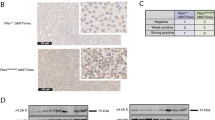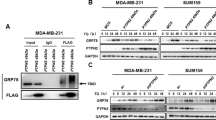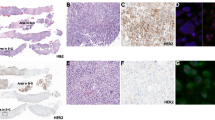Abstract
Protein tyrosine phosphatase alpha (PTPα/PTPRA) was shown previously to be overexpressed in human primary breast cancers, and to suppress apoptosis in estrogen receptor-negative breast cancer cells in vitro. However, it is not known whether PTPα is important for mammary tumor initiation, maintenance and/or progression. We have used a combination of three-dimensional cultures, a transgenic mouse model of breast cancer lacking PTPα as well as xenografts of human breast cancer cell lines to address these questions. We found that PTPα knockdown after overt tumor development reduced the growth of HER2-positive human breast cancer cell lines, and that this effect was accompanied by a reduction in AKT phosphorylation. However, PTPα knockdown did not affect invasiveness of HER2-positive human breast cancer cells grown in three-dimensional cultures. Moreover, in MMTV-NeuNT/PTPα−/− mice, PTPα ablation did not affect NeuNT-evoked tumor onset or metastasis but decreased the number of tumors per mouse. Thus, we demonstrate that PTPα contributes to both HER2/Neu-mediated mammary tumor initiation and maintenance. Our results suggest that inhibition of PTPα can have a beneficial effect on HER2-positive breast cancers, but that inhibition of additional targets is needed to block breast tumorigenesis.
This is a preview of subscription content, access via your institution
Access options
Subscribe to this journal
Receive 50 print issues and online access
$259.00 per year
only $5.18 per issue
Buy this article
- Purchase on SpringerLink
- Instant access to the full article PDF.
USD 39.95
Prices may be subject to local taxes which are calculated during checkout




Similar content being viewed by others
References
Di Cosimo S, Baselga J . Management of breast cancer with targeted agents: importance of heterogeneity. [corrected]. Nat Rev Clin Oncol 2010; 7: 139–147.
Perou CM, Borresen-Dale AL . Systems biology and genomics of breast cancer. Cold Spring Harb Perspect Biol 2011; 3: pii a003293.
Hunter T . Tyrosine phosphorylation: thirty years and counting. Curr Opin Cell Biol 2009; 21: 140–146.
Aceto N, Sausgruber N, Brinkhaus H, Gaidatzis D, Martiny-Baron G, Mazzarol G et al. Tyrosine phosphatase SHP2 promotes breast cancer progression and maintains tumor-initiating cells via activation of key transcription factors and a positive feedback signaling loop. Nat Med 2012; 18: 529–537.
Sun T, Aceto N, Meerbrey KL, Kessler JD, Zhou C, Migliaccio I et al. Activation of multiple proto-oncogenic tyrosine kinases in breast cancer via loss of the PTPN12 phosphatase. Cell 2011; 144: 703–718.
Balavenkatraman KK, Aceto N, Britschgi A, Mueller U, Bence KK, Neel BG et al. Epithelial protein-tyrosine phosphatase 1B contributes to the induction of mammary tumors by HER2/Neu but is not essential for tumor maintenance. Mol Cancer Res 2011; 9: 1377–1384.
Lin G, Aranda V, Muthuswamy SK, Tonks NK . Identification of PTPN23 as a novel regulator of cell invasion in mammary epithelial cells from a loss-of-function screen of the ‘PTP-ome’. Genes Dev 2011; 25: 1412–1425.
Julien SG, Dube N, Read M, Penney J, Paquet M, Han Y et al. Protein tyrosine phosphatase 1B deficiency or inhibition delays ErbB2-induced mammary tumorigenesis and protects from lung metastasis. Nat Genet 2007; 39: 338–346.
Bentires-Alj M, Neel BG . Protein-tyrosine phosphatase 1B is required for HER2/Neu-induced breast cancer. Cancer Res 2007; 67: 2420–2424.
Ostman A, Hellberg C, Bohmer FD . Protein-tyrosine phosphatases and cancer. Nat Rev Cancer 2006; 6: 307–320.
Ardini E, Agresti R, Tagliabue E, Greco M, Aiello P, Yang LT et al. Expression of protein tyrosine phosphatase alpha (RPTPalpha) in human breast cancer correlates with low tumor grade, and inhibits tumor cell growth in vitro and in vivo. Oncogene 2000; 19: 4979–4987.
Zheng X, Resnick RJ, Shalloway D . Apoptosis of estrogen-receptor negative breast cancer and colon cancer cell lines by PTP alpha and src RNAi. Int J Cancer 2008; 122: 1999–2007.
Pallen CJ . Protein tyrosine phosphatase alpha (PTPalpha): a Src family kinase activator and mediator of multiple biological effects. Curr Top Med Chem 2003; 3: 821–835.
Zheng XM, Wang Y, Pallen CJ . Cell transformation and activation of pp60c-src by overexpression of a protein tyrosine phosphatase. Nature 1992; 359: 336–339.
Bjorge JD, Pang A, Fujita DJ . Identification of protein-tyrosine phosphatase 1B as the major tyrosine phosphatase activity capable of dephosphorylating and activating c-Src in several human breast cancer cell lines. J Biol Chem 2000; 275: 41439–41446.
Arias-Romero LE, Saha S, Villamar-Cruz O, Yip SC, Ethier SP, Zhang ZY et al. Activation of Src by protein tyrosine phosphatase 1B is required for ErbB2 transformation of human breast epithelial cells. Cancer Res 2009; 69: 4582–4588.
Yip SC, Saha S, Chernoff J . PTP1B: a double agent in metabolism and oncogenesis. Trends Biochem Sci 2010; 35: 442–449.
Ponniah S, Wang DZ, Lim KL, Pallen CJ . Targeted disruption of the tyrosine phosphatase PTPalpha leads to constitutive downregulation of the kinases Src and Fyn. Curr Biol 1999; 9: 535–538.
Elson A . Protein tyrosine phosphatase epsilon increases the risk of mammary hyperplasia and mammary tumors in transgenic mice. Oncogene 1999; 18: 7535–7542.
Meerbrey KL, Hu G, Kessler JD, Roarty K, Li MZ, Fang JE et al. The pINDUCER lentiviral toolkit for inducible RNA interference in vitro and in vivo. Proc Natl Acad Sci USA. 2011; 108: 3665–3670.
Acknowledgements
We thank members of the Bentires-Alj laboratory for advice and discussions. Research in the laboratory of MBA is supported by the Novartis Research Foundation, the European Research Council (ERC starting grant 243211-PTPsBDC), the Swiss Cancer League and the Krebsliga Beider Basel.
Author information
Authors and Affiliations
Corresponding author
Ethics declarations
Competing interests
The authors declare no conflict of interest.
Rights and permissions
About this article
Cite this article
Meyer, D., Aceto, N., Sausgruber, N. et al. Tyrosine phosphatase PTPα contributes to HER2-evoked breast tumor initiation and maintenance. Oncogene 33, 398–402 (2014). https://doi.org/10.1038/onc.2012.585
Received:
Revised:
Accepted:
Published:
Issue date:
DOI: https://doi.org/10.1038/onc.2012.585
Keywords
This article is cited by
-
Human epidermal growth factor receptor 2 (HER2)-specific chimeric antigen receptor (CAR) for tumor immunotherapy; recent progress
Stem Cell Research & Therapy (2022)
-
Protein tyrosine phosphatases: promising targets in pancreatic ductal adenocarcinoma
Cellular and Molecular Life Sciences (2019)



